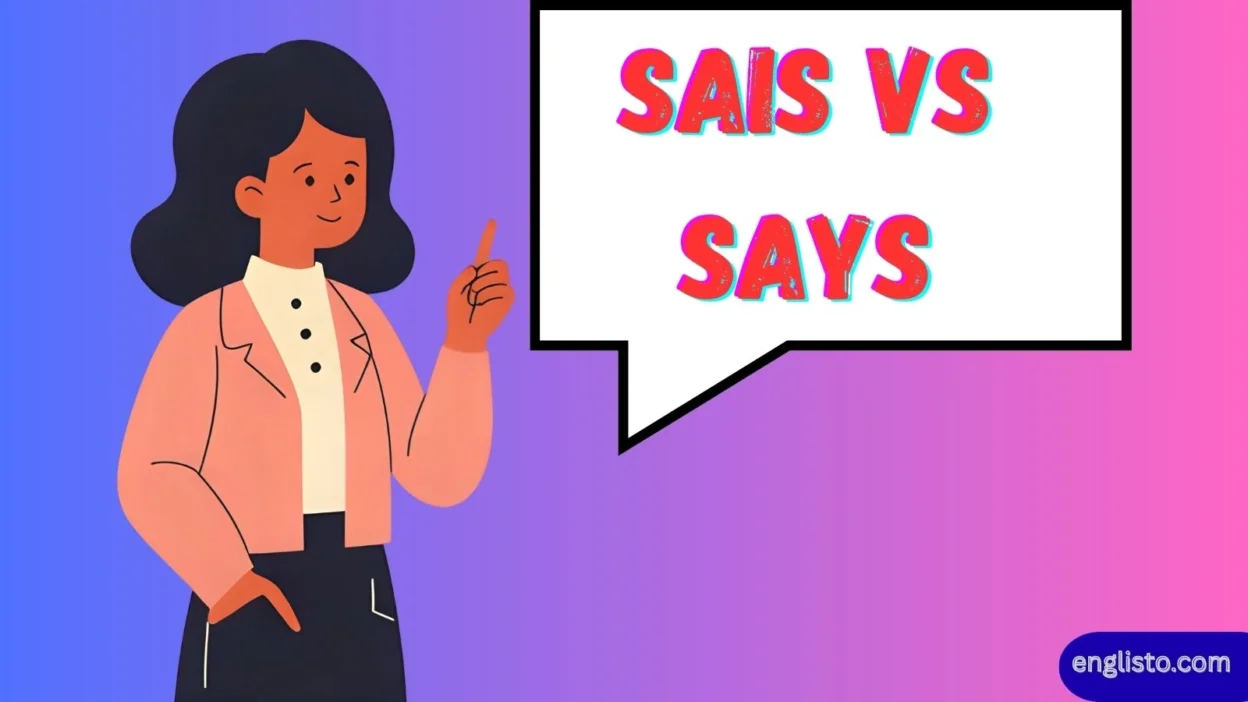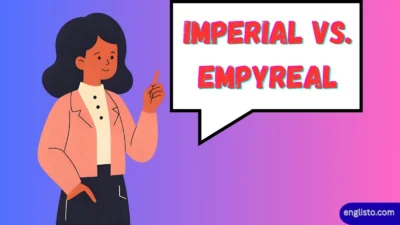Language can be tricky, especially when two words look similar but have completely different roots, meanings, and pronunciations. A classic example is “Sais vs Says” These two words often confuse learners, writers, and even native speakers at times. One belongs to French, while the other is a vital part of English communication. Knowing the difference between the two helps you write confidently, avoid mistakes, and communicate smoothly.
In this detailed guide, we’ll dive into spelling, grammar, phonetics, and practical usage with real examples. You’ll also find tables, synonym comparisons, idioms, and even memory tips to make the distinction crystal clear.
What Does “Sais” Mean?
The word “sais” comes from French, where it’s a verb form of “savoir” (to know). It’s used in the first-person singular and second-person singular present tense.
- Je sais → I know
- Tu sais → You know
So in French:
- “Je sais la réponse” = I know the answer.
- “Tu sais bien parler anglais” = You know how to speak English well.
In English writing, however, “sais” doesn’t exist as a correct word. If you use “sais” in an English sentence, it’s considered an error unless you’re quoting French.
| Form | Person | Example Sentence | English Translation |
| Je sais | 1st person singular | Je sais la vérité. | I know the truth. |
| Tu sais | 2nd person singular | Tu sais jouer du piano. | You know how to play piano. |
What Does “Says” Mean?
The word “says” is the third-person singular form of the verb “say” in English. It’s used constantly in both spoken and written communication.
Examples:
- “She says it’s going to rain tomorrow.”
- “The teacher says homework is due on Friday.”
- “The sign says the park is closed on Sundays.”
“Says” is everywhere: in books, conversations, news reports, schoolwork, and even casual texts. It’s essential for expressing messages, opinions, or facts in the present tense.
| Root Verb | Third Person Singular | Past Tense | Present Progressive |
| Say | Says | Said | Saying |
Spelling: Sais vs Says
Here’s where confusion starts. At first glance, both words seem similar, but their spelling patterns and usage are different.
| Word | Language | Correct in English? | Notes |
| Sais | French | Incorrect (unless quoting French) | Verb form of savoir |
| Says | English | Correct | Verb form of say |
👉 Remember: If you’re writing in English, always use says, not sais.
Pronunciation Guide
Spelling and pronunciation often don’t match perfectly in English, and “says” is a prime example.
- Says is pronounced /sɛz/ (like sez).
- Many beginners mistakenly pronounce it as “says” with the ay sound (like days), but that’s incorrect.
- Sais in French is pronounced /sɛ/ (like the start of set).
| Word | IPA Pronunciation | Sounds Like |
| Says (English) | /sɛz/ | sez |
| Sais (French) | /sɛ/ | seh |
💡 Memory tip: Think of “says” as rhyming with “fez” or “sez.”
Grammar Rules and Verb Tense
“Says” in English
- Root: Say
- Tense: Present
- Person: Third-person singular
Examples:
- He says hello every morning.
- She says the recipe takes 25 minutes.
- My dad says we’re going to New York next week.
“Sais” in French
- Root: Savoir (to know)
- Tense: Present
- Person: Je (I), Tu (You)
Examples:
- Je sais que tu es là. (I know that you are here.)
- Tu sais la réponse. (You know the answer.)
Common Mistakes and Confusions
Many students, beginners, and even experienced writers slip up with “sais” vs “says.” Let’s look at the usual mistakes:
| Mistake | Why It Happens | Correction |
| “She sais it’s okay.” | Confusing French spelling with English. | “She says it’s okay.” |
| “He sais hello.” | Typing error. | “He says hello.” |
| “Says” pronounced as says (rhymes with days). | Spelling misleads pronunciation. | Pronounce as sez. |
Why This Confusion Matters in Daily Communication
Using “sais” instead of “says” in English writing can:
- Confuse readers: It makes sentences look awkward.
- Affect professionalism: Mistakes in reports, articles, or emails weaken credibility.
- Slow down communication: Readers pause to make sense of the error.
Example:
- Incorrect: The teacher sais homework is due.
- Correct: The teacher says homework is due.
One letter makes all the difference between smooth, confident writing and a confusing mistake.
Memory Tricks to Remember the Difference
- Think context: If you’re writing in English, it’s always “says.”
- French class alert: Only use “sais” if you’re writing French.
- Pronunciation guide: “Says” = sez.
- Word association: “Says” contains “say” + “s.” It literally means someone is saying something.
Synonyms and Related Words
While “says” is common, you can replace it with synonyms to improve writing variety.
| Synonym | Example Sentence | Tone |
| States | The report states the facts clearly. | Formal |
| Declares | She declares her devotion with grace. | Strong |
| Utters | He utters a few words in silence. | Poetic |
| Expresses | The coach expresses determination. | Neutral |
| Indicates | The sign indicates the park is closed. | Informative |
Real-Life Usage Examples
- Signs & Labels: “The sign says STOP.”
- Books & Stories: “The character says something that changes the plot.”
- Schoolwork: “The teacher says to submit homework online.”
- Daily Life: “Mom says we’re having cake for lunch.”
- News Reports: “The government says new policies will take effect tomorrow.”
Tables for Quick Recall
Quick Comparison
| Feature | Sais | Says |
| Language | French | English |
| Meaning | Know | Speak/Express |
| Correct in English? | No | Yes |
| Pronunciation | /sɛ/ (seh) | /sɛz/ (sez) |
| Example | Tu sais la réponse. | She says hello. |
Practice Sentences
Try these to strengthen memory:
- He says good morning every day.
- She says she finished the project.
- Je sais la vérité.
- Tu sais bien parler.
FAQs on “Sais vs Says”
Q1: Is “sais” ever correct in English?
No. It’s only correct in French. In English, use “says.”
Q2: Why is “says” pronounced “sez”?
English spelling often differs from pronunciation. “Says” follows this irregular pattern.
Q3: What’s the past tense of “says”?
The past tense is “said.” Example: She said she was tired.
Q4: How can beginners avoid mixing them up?
Remember: if you’re writing in English, “says” is always right. Use “sais” only in French class.
Q5: What are common synonyms for “says”?
States, declares, indicates, expresses, utters.
Conclusion
Understanding the difference between “sais” vs “says” is more than just a spelling detail—it’s about clear, confident communication. “Says” belongs to English and is used in daily life across conversations, books, reports, and signs. “Sais” belongs to French and should stay there unless you’re studying that language.
By paying attention to spelling, pronunciation, grammar, and context, you’ll avoid confusion, impress teachers, write professional emails, and build strong communication skills.
👉 Quick recall:
- English? Always “says.”
- French? Sometimes “sais.”
Language learning is like glueing ideas together—you practice, make mistakes, and get better each day. And now, when it comes to “sais” vs “says,” you’ll never hesitate again.



